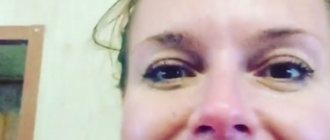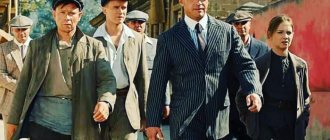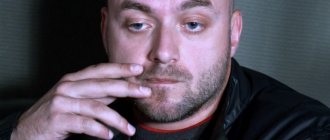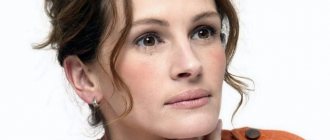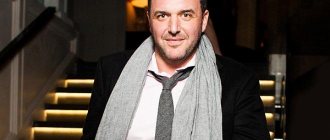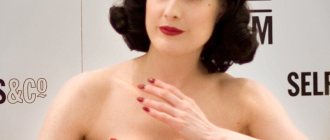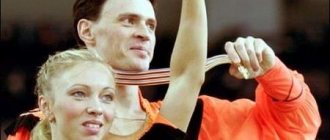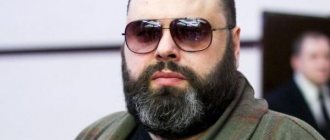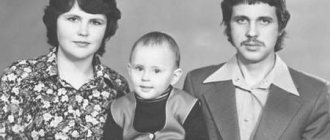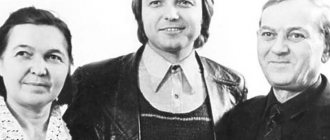Wikipedia has articles about other people with the last name Dakhnenko.
| Maxim Dakhnenko | |
| Birth name: | Maxim Arkadyevich Dakhnenko |
| Date of Birth: | March 31, 1972(1972-03-31) (age 48) |
| Place of Birth: | Kemerovo, Kemerovo region, RSFSR, USSR |
| Profession: | actor |
| Citizenship: | USSR USSR→Russia Russia |
| Years active: | 1993 - present time |
| Theater: | Moscow Art Theater named after M. Gorky |
| Awards: | |
Maxim Arkadievich Dakhnenko
(born March 31, 1972, Kemerovo, Kemerovo region, RSFSR, USSR) - Russian theater and film actor. Honored Artist of the Russian Federation (2006)[1].
Biography
Maxim Dakhnenko was born on March 31, 1972 in the Siberian city of Kemerovo.
Father - Arkady Evstafievich Dakhnenko (January 12, 1938 - April 7, 1993), Honored Artist of the RSFSR (since 1981), since 1977 he was a member of the troupe of the Kemerovo Regional Drama Theater named after A.V. Lunacharsky[2].
In 1993, Maxim Dakhnenko graduated from the Higher Theater School named after M. S. Shchepkin (course of V. A. Safronov) in Moscow and was accepted into the troupe of the Moscow Art Academic Theater named after M. Gorky (Moscow Art Theater named after M. Gorky)[3].
On August 1, 2006, “for services in the field of art,” Maxim Arkadyevich Dakhnenko was awarded the honorary title “Honored Artist of the Russian Federation”[1].
The most interesting
A fan of Jolie has undergone many operations, wanting to be like the actress (12/15/2017)
Top 10 curiosities at the Oksar Awards (December 22, 2017)
As you know, Maxim is on excellent terms with the family of Alexei Nilov. They spend almost all weekends and celebrations together. Their friendship has lasted for several years. According to the actor himself, this is exactly the case when complete strangers become family.
Creation
Roles in the theater
Moscow Art Theater named after Maxim Gorky
Maxim Dakhnenko has been a member of the Maxim Gorky Moscow Art Theater troupe since 1993 and over the years has been involved in the following performances[3]:
- 2015 - “Hamlet” based on the tragedy of the same name by William Shakespeare, director Valery Belyakovich - Laertes, son of Polonius
- 2013 - “Savage” based on the play of the same name by A. N. Ostrovsky, director Tatyana Doronina - Viktor Vasilyevich Vershinsky, landowner
[4] - 2012 - “I don’t want you to marry a prince...” based on the play “Shadow” by Evgeniy Schwartz, director Tatyana Doronina - Scientist
- 2010 - “So it will be” based on the play of the same name by Konstantin Simonov, director Tatyana Doronina - Sergei Nikolaevich Sinitsyn
- 2010 - “Three Sisters” based on the play of the same name by Anton Chekhov, director V. I. Nemirovich-Danchenko, director of the revival Tatyana Doronina - Vasily Vasilyevich Solyony, staff captain
- 2009 - “The Master and Margarita” based on the novel of the same name by Mikhail Bulgakov, director Valery Belyakovich - Matvey Levi, disciple of Yeshua
- 2009 - “Street Hunter” based on the comedy of the same name by Alexei Yakovlev, director Tatyana Doronina - simply Slava
- 2008 - “The Master's Comedians” based on the play by Molière, directed by Tatyana Doronina - Marquis d'Orsigny, duelist nicknamed "One-Eyed"
- 2007 - “Praise to the Russian Word” (anniversary evening of Valentin Rasputin) - Reader
- 2007 - “Handsome Man” based on the comedy of the same name by A. N. Ostrovsky, director V. N. Ivanov - Apollo Evgenyich Okoyomov, husband of Zoya Vasilievna, handsome man
[5] - 2006 - “The Marriage of Belugin” based on the play of the same name by Alexander Ostrovsky and Nikolai Solovyov, director Tatyana Doronina - Nikolai Egorovich Agishin
- 2006 - “Russian Vaudeville” based on the play “Actor” by N. A. Nekrasov and V. A. Sollogub; director Tatyana Doronina - Sukhozhilov
- 2005 - “Years of Wandering” based on the play of the same name by A. N. Arbuzov, director Yu. E. Aksenov - Alexander Vedernikov
- 2004 - “Farewell in June” based on the play of the same name by Alexander Vampilov, director Tatyana Doronina - Bukin, student of the geological faculty, Masha’s fiancé
- 2003 - “Vassa Zheleznova” based on the play of the same name by Maxim Gorky, director B. Shchedrin - Alyoshka Pyatyorkin, sailor, Anna’s boyfriend
- 2003 - “Stupid for others, smart for yourself” by Lope de Vega, director V. Ivanov - Alejandro
- 2002 - “Warm Heart” based on the play of the same name by A. N. Ostrovsky, director Valery Belyakovich - Vasya Shustry, the son of a recently bankrupt merchant
- 2001 - “Humiliated and Insulted” based on the play of the same name by F. M. Dostoevsky, director Tatyana Doronina - Ivan Petrovich (narrated on his behalf)
- 2001 - “Crazy Jourdain” based on the play of the same name by Mikhail Bulgakov, director Tatyana Doronina - Hubert (Mrs. Jourdain) / Dorant / Fencing teacher
- 2000 - “Guilty Without Guilt” based on the play of the same name by A. N. Ostrovsky, director Tatyana Doronina - Petya Milovzorov, first lover
- 2000 - “Zoyka’s Apartment” based on the play of the same name by Mikhail Bulgakov, director Tatyana Doronina - Gan-Dza-Lin aka Gandzolin, Chinese, 40 years old
- 2000 - “The Invisible Lady” based on the comedy of the same name by P. Calderon, director Tatyana Doronina - Don Manuel / Don Don Juan de Toledo, friend of Don Manuel / Don Luis, brother of Don Juan
- 1999 - “On the Wedding Day” based on the play of the same name by Viktor Rozov, director Valery Uskov - Mikhail Zabolotny, main character, groom
- 1999 - “At the Lower Depths” based on the play of the same name by Maxim Gorky, director Valery Belyakovich - Vaska Pepel, thief, 28 years old
- 1999 - “One love of my soul” based on the poem “Angelo” by Alexander Sergeevich Pushkin, director Tatyana Doronina - Angelo
- 1998 - “Madame Alexandra” based on the play “Don’t Wake Madame” by Jean Anouilh, director Tatyana Doronina - Arman
- 1998 - “The Monk and the Imp” based on the novel “The Brothers Karamazov” by F. M. Dostoevsky, director A. Semenov (small stage) - Dmitry Fedorovich Karamazov (Mitya)
- 1997 - “Her Friends” by V. S. Rozov, director Valery Uskov - Volodya Chernyshev
- 1997 - “The Blue Bird” based on the play by Maurice Maeterlinck - Fire
- 1997 - “Three Sisters” based on the play of the same name by A. P. Chekhov, director Tatyana Doronina - Vasily Vasilyevich Solyony, staff captain
- 1997 - “Kozma Minin” by A. N. Ostrovsky, director Valery Belyakovich
-
Sagittarius - 1997 - “Precipice” by I. A. Goncharov, director A. Sozontov - Mark Volokhov
- 1996 - “Family Holidays” by V. Belov, director A. Vasiliev (small stage) - Valeryan
- 1995 - “Torkin is alive and will be” based on the play “Vasily Terkin” by A. T. Tvardovsky, director Tatyana Doronina - Soldier
- 1995 - “Version of Angleterre” based on the play by A. Yakovlev, director Tatyana Doronina - Chekist
- 1994 - “Profitable Place” based on the play of the same name by A. N. Ostrovsky, director Tatyana Doronina - Gypsy
- 1994 - “Women in the National Assembly” by Aristophanes, director M. Abramov - Kenesius
- 1993 - “The White Guard” based on the novel of the same name by Mikhail Bulgakov, director Tatyana Doronina - Sergei Ivanovich Talberg, captain of the general staff, serving in the Hetman War Ministry, Elena’s husband, conformist / Viktor Viktorovich Myshlaevsky, lieutenant, friend of the Turbin family, Alexei’s friend at the Alexander Gymnasium
- 1993 - “Farewell to Matera” based on the story of the same name by Valentin Rasputin, director A. Borisov - member of the fire brigade
- 1993 - “We are going to watch Chapaev” by O. Danilov (in memory of Igor Talkov), director Tatyana Doronina - Leva
Other theater projects
- 2002 - “Who’s last for love?” E. Kuznetsova, director D. Gornik (Lekur Theater Agency) - Senya
- 2001 - “Point of Honor” (“Point d'Honneur”; first title - “Duel”) based on the works of W. Shakespeare, E. Rostand, A. Dumas, director Andrei Ryklin (Andrei Ryklin Theater Project) -
- 2000 - “Spanish Lessons” by K. Friese and O. Fomicheva, director Oksana Fomicheva (Premiere Theatre, youth Russian-Spanish theater project, on the stage of the School of Modern Play theater) - Antonio
Filmography
- 2001 - Detectives - Belugin
- 2001 - Kulagin and partners - episode
- 2001 - Hunting season 2 - operational officer
- 2004 - Dasha Vasilyeva. Private Eye Lover (Season 3; Movie No. 7 "Pool with Crocodiles") - episode
- 2006 - Young and Evil - Realtor
- 2007 - Servant of the Sovereigns - Swedish drabant
- 2009 - Semin - Kostrikov
- 2010-2011 - Notes of the forwarder of the Secret Chancery - Van Hoover, illusionist
- 2011 — Moscow. Three stations (series No. 56 “Golden Goal”) - Chernyshev, Savelyev’s companion
- 2011 - International airline pilot - episode
- 2012 - Emergency Situation (ES) (episode No. 4) - diplomat, brother of Alexei Filatov
- 2013 - Chef 2 (episode No. 22 “Escape”) - Igor Suslov, Daria’s ex-husband
- 2014 - Exchange - Tokarev
- 2014 - Last day - “Marcello”, criminal “authority”
- 2015 - Leningrad 46 (film No. 1 “Musician”, series No. 1-4) - “Vobla”, the leader of one of the St. Petersburg gangs
- 2015 - High stakes - “Captain”, head of the security service of the illegal casino of the St. Petersburg crime boss nicknamed “Cosmonaut”
(main role)[6] - 2016 - Survive after 3 (episodes No. 25-32) - Sergei Viktorovich Ershov, FSB major, inspector, head of the internal security department of the Vershina corporation
Game duplication
- 2016 - The Witcher 3: Blood and Wine - Dettlaff
Film dubbing
- 2012 - Resident Evil: Retribution
Film career
Maxim Dakhnenko starred in films for the first time in 2001 and in two films at once: “Detectives” and “Hunting Season.” After that, he played episodic roles in the TV series: “Dasha Vasilyeva” and “Kulagin and Partners”.
Since 2006, Maxim Dakhnenko has been actively acting. His best works in the films: “The Young and the Evil”, “Syomin”, “Notes of the Forwarder of the Secret Chancellery”, “Moscow. Three Stations", "Exchange", "Last Day", "Nevsky", "Fathers", "High Stakes", "Wings of the Empire", "Our Happy Tomorrow", "Anna the Detective", "Leningrad 46", "Second vision".
The actor's real popularity came from his role as "Captain" in the TV series "High Stakes." Numerous reviews from viewers and film critics indicate Dakhnenko’s undoubted acting talent. The partners in the film were former “cop” Alexei Nilov and Sergei Gubanov. Together they created an inimitable trio that keeps the viewer in suspense until the very end.
The film was a great success, and in 2020 a sequel to the series “High Stakes. Revenge". New characters were added here performed by Lukerya Ilyashenko and Sergei Volkov. The second part of the series turned out to be no less dramatic and eventful than the first. The film premiered on March 12, 2020 and has already received a lot of positive reviews from film critics.
The actor’s performance is considered so heartfelt that you inevitably don’t notice the other characters, before your eyes is only the sensual image of the inimitable “Captain”. And to play a negative character so that he is sympathetic to the viewer is the highest skill of an actor.
Confession
State awards and titles
- 2006 - honorary title “Honored Artist of the Russian Federation” - for services in the field of art
[1].
Public awards and titles
- 2004 - laureate of the literary and theatrical award "Crystal Rose of Viktor Rozov" - for performing roles in Viktor Sergeevich Rozov's plays "Her Friends" and "On the Wedding Day" on the stage of the Moscow Art Theater named after M. Gorky
[3]. - 2010 - commemorative medal “Patriot of Russia”.
Notes
- ↑ 123
[docs.cntd.ru/document/901990567 Decree of the President of the Russian Federation V. Putin No. 810 of August 1, 2006 “On awarding state awards of the Russian Federation.”] JSC “Kodeks” // docs.cntd.ru - [www.kemdrama.ru/news/2013/04/06/svetlaya-pamyat “Blessed Memory...” - 20 years since the death of Arkady Dakhnenko, Honored Artist of the RSFSR. Biography of the actor.] Official website of the Kemerovo Regional Drama Theater named after A.V. Lunacharsky // kemdrama.ru (April 6, 2013)
- ↑ 123
[www.mxat-teatr.ru/docs/tpl/actor.asp?id=59& Theater troupe. Honored Artist of Russia Maxim Arkadievich Dakhnenko. Creative biography, roles in the theater.] Official website of the Moscow Art Theater named after M. Gorky // mxat-teatr.ru - [tvkultura.ru/article/show/article_id/103991/ VIDEO. Culture News. Broadcast on December 2, 2013. Ostrovsky’s “Savage” is presented at the Gorky Moscow Art Theater.] State Internet channel “Russia” // tvkultura.ru
- [tvkultura.ru/article/show/article_id/46785/ “The story of a beautiful man.” — The play “Handsome Man” based on Ostrovsky’s play is the first premiere of this year on the stage of the Gorky Moscow Art Theater.] State Internet channel “Russia” // tvkultura.ru (January 9, 2007)
- [www.ntv.ru/serial/Visokie_stavki/m50880/o362958/ VIDEO. All episodes of the television series “High Stakes” directed by Bogdan Drobyazko (premiere: November 2, 2020).] NTV channel // ntv.ru
Links
- [www.afisha.ru/people/295599/ Maxim Dakhnenko. Review of performances with the participation of an actor.] // afisha.ru
- [ruskino.ru/art/2129 Maxim Dakhnenko. Filmography of the actor.] // ruskino.ru
- [www.vokrug.tv/person/show/Maksim_Dakhnenko/ Maxim Dakhnenko. Biography.] Website “Around TV” // vokrug.tv
- Maria Monomenova
. [mxat-teatr.ru/docs/tpl/doc_clean.asp?id=174& “My favorite role” - interview with Maxim Dakhnenko “Theater Playbill” (March 2005).] // mxat-teatr.ru - [mxat-teatr.ru/docs/tpl/doc.asp?id=326& Excerpts from articles in the Russian press about the roles of Maxim Dakhnenko.] // mxat-teatr.ru
Maxim Dakhnenko’s wife – photo
Quite a few fans often look for information about whether Maxim Dakhnenko lives with his wife and whether he has children. However, the actor himself considers it unnecessary to talk about this information, so he hides it in every possible way. Despite the fact that he actively maintains a page on Instagram and often posts interesting photographs there, the photo of Maxim Dakhnenko’s wife is not among them.
The actor also does not answer questions asked by journalists about his personal life. Perhaps this means that the actor simply does not have a wife. Or maybe Maxim Dakhnenko and his wife mutually decided that strangers, even if they are the actor’s most devoted fans, should not know what the actor himself does not want.
Perhaps interesting: the wife of Maxim Matveev, the wife of Maxim Matveev.
An excerpt characterizing Dakhnenko, Maxim Arkadievich
“That’s true, but you need to know what and how many troops,” said Dolokhov, “you will need to go.” Without knowing exactly how many there are, you cannot start the business. I like to do things carefully. Now, would any of the gentlemen want to go with me to their camp? I have my uniforms with me. - I, I... I will go with you! – Petya screamed. “You don’t need to go at all,” Denisov said, turning to Dolokhov, “and I won’t let him in for anything.” - That's great! - Petya cried out, - why shouldn’t I go?.. - Yes, because there is no need. “Well, excuse me, because... because... I’ll go, that’s all.” Will you take me? – he turned to Dolokhov. “Why…” answered Dolokhov absentmindedly, peering into the face of the French drummer. - How long have you had this young man? – he asked Denisov. - Today they took him, but he doesn’t know anything. I left it for myself. - Well, where are you putting the rest? - said Dolokhov. - How to where? I'm sending you under the guard! – Denisov suddenly blushed and cried out. “And I can boldly say that there is not a single person on my conscience.” Is it really right for you to send away a person under escort in a city, what to do, I will tell you, the honor of a soldier. “It’s decent for a young count of sixteen to say these pleasantries,” Dolokhov said with a cold grin, “but it’s time for you to leave it.” “Well, I’m not saying anything, I’m just saying that I will definitely go with you,” Petya said timidly. “And it’s time for you and me, brother, to give up these pleasantries,” Dolokhov continued, as if he found special pleasure in talking about this subject that irritated Denisov. - Well, why did you take this to you? - he said, shaking his head. - Then why do you feel sorry for him? After all, we know these receipts of yours. You send them a hundred people, and thirty will come. They will starve or be beaten. So is it all the same not to take them? Esaul, narrowing his bright eyes, nodded his head approvingly. - This is all shit, there’s nothing to discuss here. I don’t want to take it on my soul. You talk - pomg'ut. Well, hog'osho. Just not from me. Dolokhov laughed. “Who didn’t tell them to catch me twenty times?” But they will catch me and you, with your chivalry, anyway. – He paused. - However, we have to do something. Send my Cossack with a pack! I have two French uniforms. Well, are you coming with me? – he asked Petya. - I? Yes, yes, absolutely,” Petya cried, blushing almost to tears, looking at Denisov. Again, while Dolokhov was arguing with Denisov about what should be done with the prisoners, Petya felt awkward and hasty; but again I did not have time to fully understand what they were talking about. “If big, famous people think so, then it must be so, therefore it’s good,” he thought. “And most importantly, Denisov must not dare to think that I will obey him, that he can command me.” I will definitely go with Dolokhov to the French camp. He can do it and so can I.” To all of Denisov’s urgings not to travel, Petya replied that he, too, was used to doing everything carefully, and not Lazar’s at random, and that he never thought about danger to himself. “Because,” you yourself must agree, “if you don’t know correctly how many there are, the lives of maybe hundreds depend on it, but here we are alone, and then I really want this, and I will definitely, definitely go, you won’t stop me.” “, he said, “it will only get worse... Dressed in French greatcoats and shakos, Petya and Dolokhov drove to the clearing from which Denisov looked at the camp, and, leaving the forest in complete darkness, descended into the ravine. Having driven down, Dolokhov ordered the Cossacks accompanying him to wait here and rode at a fast trot along the road to the bridge. Petya, transfixed with excitement, rode next to him. “If we get caught, I won’t give up alive, I have a gun,” Petya whispered. “Don’t speak Russian,” Dolokhov said in a quick whisper, and at that same moment a cry was heard in the darkness: “Qui vive?” [Who's coming?] and the ringing of a gun. Blood rushed to Petya's face, and he grabbed the pistol. “Lanciers du sixieme, [Lancers of the sixth regiment.],” said Dolokhov, without shortening or increasing the horse’s stride. The black figure of a sentry stood on the bridge. – Mot d'ordre? [Feedback?] – Dolokhov held his horse and rode at a walk. – Dites donc, le colonel Gerard est ici? [Tell me, is Colonel Gerard here?] - he said. – Mot d'ordre! - Without answering, the sentry said, blocking the road. “Quand un officier fait sa ronde, les sentinelles ne demandent pas le mot d'ordre...” Dolokhov shouted, suddenly flushing, running his horse into the sentry. – Je vous demande si le colonel est ici? [When the officer goes around the chain, the sentries do not ask for feedback... I ask, is the colonel here?] And, without waiting for an answer from the guard who stood aside, Dolokhov walked up the hill at a walk. Noticing the black shadow of a man crossing the road, Dolokhov stopped this man and asked where the commander and officers were? This man, a soldier with a sack on his shoulder, stopped, came close to Dolokhov’s horse, touching it with his hand, and simply and friendlyly said that the commander and officers were higher on the mountain, on the right side, in the farm yard (that’s what he called the master’s estate). Having driven along the road, on both sides of which French conversation could be heard from the fires, Dolokhov turned into the courtyard of the manor’s house. Having passed through the gate, he dismounted from his horse and approached a large blazing fire, around which several people were sitting, talking loudly. Something was boiling in a pot on the edge, and a soldier in a cap and blue overcoat, kneeling, brightly illuminated by the fire, stirred it with a ramrod. “Oh, c'est un dur a cuire, [You can’t deal with this devil.]” said one of the officers sitting in the shadows on the opposite side of the fire. “Il les fera marcher les lapins... [He will get through them...],” said another with a laugh. Both fell silent, peering into the darkness at the sound of the steps of Dolokhov and Petya, approaching the fire with their horses. - Bonjour, messieurs! [Hello, gentlemen!] - Dolokhov said loudly and clearly. The officers stirred in the shadow of the fire, and one, a tall officer with a long neck, walked around the fire and approached Dolokhov. – C'est vous, Clement? - he said. – D'ou, diable... [Is that you, Clément? Where the hell...] - but he didn’t finish, having learned his mistake, and, frowning slightly, as if he were a stranger, he greeted Dolokhov, asking him how he could serve. Dolokhov said that he and a friend were catching up with their regiment, and asked, turning to everyone in general, if the officers knew anything about the sixth regiment. Nobody knew anything; and it seemed to Petya that the officers began to examine him and Dolokhov with hostility and suspicion. Everyone was silent for a few seconds. “Si vous comptez sur la soupe du soir, vous venez trop tard, [If you are counting on dinner, then you are late.],” said a voice from behind the fire with a restrained laugh. Dolokhov replied that they were full and that they needed to move on at night. He gave the horses to the soldier who was stirring the pot, and squatted down by the fire next to the long-necked officer. This officer, without taking his eyes off, looked at Dolokhov and asked him again: what regiment was he in? Dolokhov did not answer, as if he had not heard the question, and, lighting a short French pipe, which he took out of his pocket, asked the officers how safe the road was from the Cossacks ahead of them. “Les brigands sont partout, [These robbers are everywhere.],” answered the officer from behind the fire. Dolokhov said that the Cossacks were terrible only for such backward people as he and his comrade, but that the Cossacks probably did not dare to attack large detachments, he added questioningly. Nobody answered. “Well, now he’ll leave,” Petya thought every minute, standing in front of the fire and listening to his conversation. But Dolokhov again began the conversation that had stopped and directly began asking how many people they had in the battalion, how many battalions, how many prisoners. Asking about the Russian prisoners who were with their detachment, Dolokhov said: “La vilaine affaire de trainer ces cadavres apres soi.” Vaudrait mieux fusiller cette canaille, [It’s a bad thing to carry these corpses around with you. It would be better to shoot this bastard.] - and laughed loudly with such a strange laugh that Petya thought the French would now recognize the deception, and he involuntarily took a step away from the fire. No one responded to Dolokhov’s words and laughter, and the French officer, who was not visible (he was lying wrapped in an overcoat), stood up and whispered something to his comrade. Dolokhov stood up and called to the soldier with the horses. “Will they serve the horses or not?” - Petya thought, involuntarily approaching Dolokhov. The horses were brought in. “Bonjour, messieurs, [Here: farewell, gentlemen.],” said Dolokhov. Petya wanted to say bonsoir [good evening] and could not finish the words. The officers were whispering something to each other. Dolokhov took a long time to mount the horse, which was not standing; then he walked out of the gate. Petya rode beside him, wanting and not daring to look back to see whether the French were running or not running after them. Having reached the road, Dolokhov drove not back into the field, but along the village. At one point he stopped, listening. - Do you hear? - he said. Petya recognized the sounds of Russian voices and saw the dark figures of Russian prisoners near the fires. Going down to the bridge, Petya and Dolokhov passed the sentry, who, without saying a word, walked gloomily along the bridge, and drove out into the ravine where the Cossacks were waiting. - Well, goodbye now. Tell Denisov that at dawn, at the first shot,” said Dolokhov and wanted to go, but Petya grabbed him with his hand. - No! - he cried, - you are such a hero. Oh, how good! How great! How I love you. “Okay, okay,” said Dolokhov, but Petya did not let him go, and in the darkness Dolokhov saw that Petya was bending down towards him. He wanted to kiss. Dolokhov kissed him, laughed and, turning his horse, disappeared into the darkness. X Returning to the guardhouse, Petya found Denisov in the entryway. Denisov, in excitement, anxiety and annoyance at himself for letting Petya go, was waiting for him. - God bless! - he shouted. - Well, thank God! - he repeated, listening to Petya’s enthusiastic story. - Why don’t I sleep because of you! - Denisov said. - Well, thank God, go to bed now. We'll rise again until the end. “Yes... No,” said Petya. – I don’t want to sleep yet. Yes, I know myself, if I fall asleep, it’s over. And then I got used to not sleeping before the battle. Petya sat for some time in the hut, joyfully recalling the details of his trip and vividly imagining what would happen tomorrow. Then, noticing that Denisov had fallen asleep, he got up and went into the yard. It was still completely dark outside. The rain had passed, but drops were still falling from the trees. Close to the guardhouse one could see black figures of Cossack huts and horses tied together. Behind the hut were two black wagons with horses standing, and in the ravine the dying fire was red. The Cossacks and hussars were not all asleep: in some places, along with the sound of falling drops and the nearby sound of horses chewing, soft, as if whispering voices were heard. Petya came out of the entryway, looked around in the darkness and approached the wagons. Someone was snoring under the wagons, and saddled horses stood around them, chewing oats. In the darkness, Petya recognized his horse, which he called Karabakh, although it was a Little Russian horse, and approached it. “Well, Karabakh, we’ll serve tomorrow,” he said, smelling her nostrils and kissing her. - What, master, aren’t you sleeping? - said the Cossack sitting under the truck. - No; and... Likhachev, I think your name is? After all, I just arrived. We went to the French. - And Petya told the Cossack in detail not only his trip, but also why he went and why he believes that it is better to risk his life than to make Lazar at random. “Well, they should have slept,” said the Cossack. “No, I’m used to it,” answered Petya. - What, you don’t have flints in your pistols? I brought it with me. Isn't it necessary? You take it. The Cossack leaned out from under the truck to take a closer look at Petya. “Because I’m used to doing everything carefully,” said Petya. “Some people just don’t get ready, and then they regret it.” I don't like it that way. “That’s for sure,” said the Cossack. “And one more thing, please, my dear, sharpen my saber; dull it... (but Petya was afraid to lie) it was never sharpened. Can this be done? - Why, it’s possible. Likhachev stood up, rummaged through his packs, and Petya soon heard the warlike sound of steel on a block. He climbed onto the truck and sat on the edge of it. The Cossack was sharpening his saber under the truck. - Well, are the fellows sleeping? - said Petya. - Some are sleeping, and some are like this. - Well, what about the boy? - Is it spring? He collapsed there in the entryway. He sleeps with fear. I was really glad. For a long time after this, Petya was silent, listening to the sounds. Footsteps were heard in the darkness and a black figure appeared. -What are you sharpening? – the man asked, approaching the truck. - But sharpen the master’s saber. “Good job,” said the man who seemed to Petya to be a hussar. - Do you still have a cup? - And over there by the wheel. The hussar took the cup. “It’ll probably be light soon,” he said, yawning, and walked off somewhere. Petya should have known that he was in the forest, in Denisov’s party, a mile from the road, that he was sitting on a wagon captured from the French, around which the horses were tied, that the Cossack Likhachev was sitting under him and sharpening his saber, that there was a big black spot to the right is a guardhouse, and a bright red spot below to the left is a dying fire, that the man who came for a cup is a hussar who was thirsty; but he knew nothing and did not want to know it. He was in a magical kingdom in which there was nothing like reality. A large black spot, perhaps there was definitely a guardhouse, or perhaps there was a cave that led into the very depths of the earth. The red spot might have been fire, or maybe the eye of a huge monster. Maybe he’s definitely sitting on a wagon now, but it’s very possible that he’s not sitting on a wagon, but on a terribly high tower, from which if he fell, he’d fly to the ground for a whole day, a whole month - keep flying and never reach it . It may be that just a Cossack Likhachev is sitting under the truck, but it may very well be that this is the kindest, bravest, most wonderful, most excellent person in the world, whom no one knows. Maybe it was just a hussar passing for water and going into the ravine, or maybe he just disappeared from sight and completely disappeared, and he was not there.
